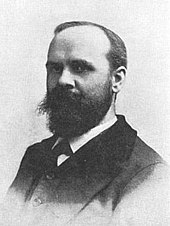Benjamin Tucker
Benjamin Ricketson Tucker (born April 17, 1854 in South Dartmouth, Massachusetts , † June 22, 1939 in Monaco ) was an American journalist and anarchist .
Life
In 1881 Tucker founded the magazine "Liberty", which appeared until 1908. The "Liberty" offered a widely used and influential platform for various representatives of a radical concept of freedom .
Tucker was described by contemporaries as a pleasant, polite, and sociable gentleman. He has also been described as a militant critic and brilliant public speaker with an engaging and formidable personality. When in 1908, after a fire ruined his publishing house, Tucker suddenly stopped publishing “Freiheit” and moved to France, America's individual anarchist scene was robbed of its most important figure.
Think
Tucker was initially in the tradition of North American freedom thinkers such as Thomas Jefferson , Josiah Warren , Lysander Spooner , Ralph Waldo Emerson and Henry David Thoreau . Soon the influence of the European anarchists Pierre-Joseph Proudhon and Michail Bakunin , whose more important writings he translated into English and edited. Tucker was one of the founders of individual anarchism . Going back initially to Kant , this concept of anarchism emphasized the "equal freedom of all". Later, Tucker referred primarily to Max Stirner , whose book The One and His Own (1845) he first published in English translation in 1907 ( The Ego and His Own ). Like many anarchists, Tucker was a consistent opponent of authoritarian communism and state socialism . He described his position as anarchic socialism. Because Tucker was a consistent opponent of the state principle, he refused to pay taxes for years and accepted prison terms for it.
Tucker argued that the deplorable situation of American workers stemmed from four legal monopolies fed by state authoritarianism: money monopoly, land monopoly, tariffs, and patents.
In Germany the poet and writer John Henry Mackay and the author Kurt Zube represented the teachings of Tucker.
Web links
- Literature by and about Benjamin Tucker in the catalog of the German National Library
- Memories of Benjamin Tucker by John William Lloyd (1935)
| personal data | |
|---|---|
| SURNAME | Tucker, Benjamin |
| ALTERNATIVE NAMES | Tucker, Benjamin Ricketson (full name) |
| BRIEF DESCRIPTION | American journalist and anarchist |
| DATE OF BIRTH | April 17, 1854 |
| PLACE OF BIRTH | South Dartmouth, Massachusetts |
| DATE OF DEATH | June 22, 1939 |
| Place of death | Monaco |
